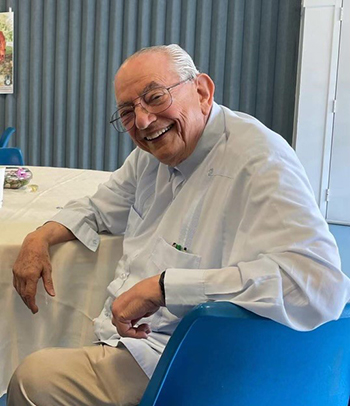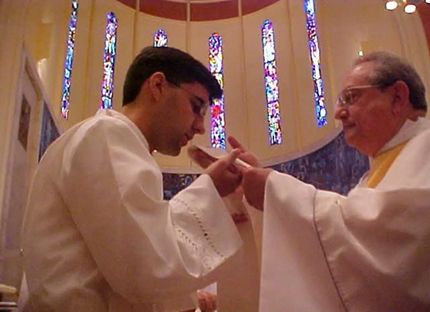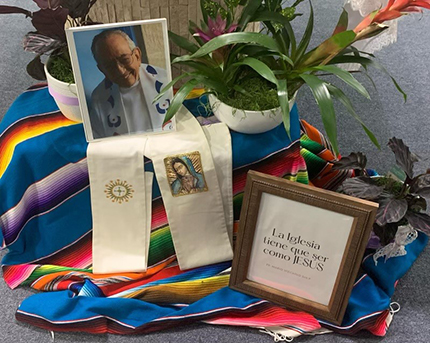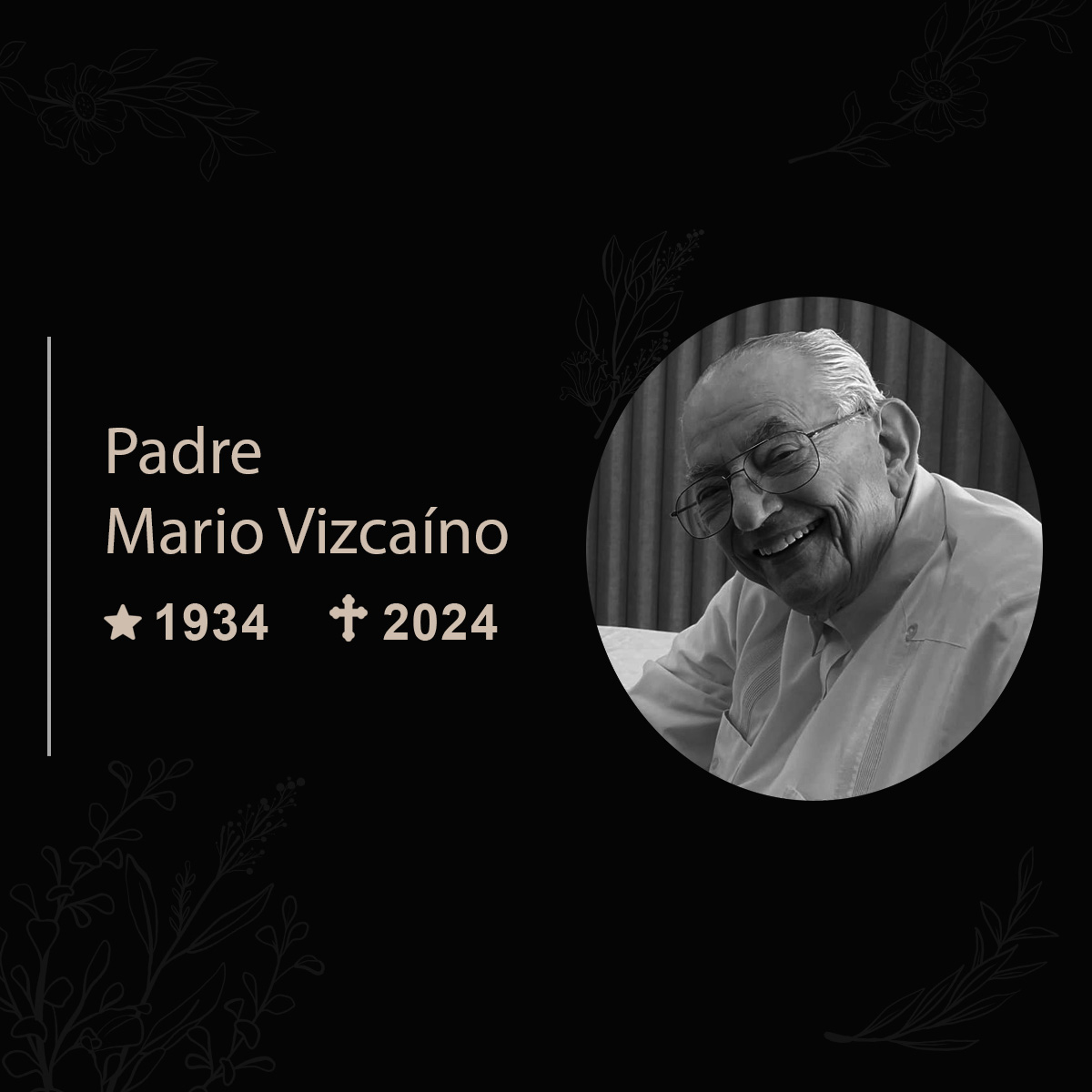By Rocio Granados - La Voz Catolica
MIAMI | Father Mario Vizcaíno, a missionary and teacher who for almost 40 years promoted Hispanic ministry in the United States as founder and director of the Southeast Pastoral Institute, SEPI, has died at the age of 89.
He died the evening of Feb. 13, at the Piarist community of St. Joseph Calasanz in Hialeah, while under the care of Catholic Hospice. He had been a Piarist religious for more than 60 years.

Photographer: Courtesy
Always smiling, Father Mario Vizcaíno is seen in this file photo during a meeting of the Southeast Pastoral Institute, SEPI. The Piarist priest died Feb. 13, 2024, at age 89, while under the care of Catholic Hospice in the St. Joseph Calasanz Piarist community in Hialeah. Father Vizcaíno, born Aug. 20, 1934, had been a Piarist religious for more than 60 years.
"He was characterized by his smile. He always smiled. A very dedicated person. A 24/7 priest, with a full agenda. A very great love for SEPI and for Hispanic ministry in the southeastern United States," said his friend, Guillermo Fernandez-Toledo.
Father Vizcaíno led SEPI for almost 40 years, from 1978 to 2016. SEPI, which is the educational arm of the Southeast Regional Office for Hispanic Ministry, was founded in 1979, a year after the creation of the Southeast U.S. Pastoral Institute, with Father Vizcaíno as director. Its creation followed the recommendation of the II National Encuentro of Hispanic Pastoral Ministry, where Father Vizcaíno served as regional coordinator.
Similar regional offices were established in the northeastern, northwestern and southwestern United States. “The only one that really survived and still is prospering today is SEPI. That has something to do with the work that Father Vizcaíno did for many years," said Archbishop Thomas Wenski, who first met the Piarist priest as a seminarian and deacon at St. Benedict Parish in Hialeah, where Father Vizcaíno celebrated Masses in Spanish.
SEPI "was a bridge for dioceses with limited resources that allowed them to meet the needs of the growing Hispanic populations in those states," the archbishop said. “At the same time, SEPI helped them train people” as future leaders in those communities.
"The bishops of the dioceses in the region are very grateful for SEPI,” but, in particular, “the original bishops [of those dioceses] highly regarded him," the archbishop added.
"He has been the soul of Hispanic ministry in the Southeast when that impetus was needed, in the face of the growing influx of Hispanics of Catholic culture in need of support and formation," said Araceli Cantero, former editor of La Voz Católica who for decades reported on Father Vizcaíno's work in the Southeast region. "With his departure Father Vizcaíno leaves behind a legacy of commitment, vision and creativity on behalf of evangelization and the advancement of Hispanic Catholics in the United States."
"When SEPI began, there were no Masses in Spanish in some dioceses of the Southeast and now, 40 years later, there are Masses in all the dioceses,” said Father Manny Álvarez, pastor of Little Flower Church in Coral Gables, whose family had known Father Vizcaíno since 1975. “He walked with my family. We got together every Jan. 1, celebrated Mass with him, and began the new year together.”
MISSIONARY SOUL
According to Father Álvarez, Father Vizcaíno had a "missionary soul. He was always looking for new ways to communicate the Gospel to reach different people," he said. "He lived the new evangelization that John Paul II preached."
During summers in high school, when he was, 15, 16, and 17, Father Álvarez would accompany Father Vizcaíno to the Piarist Fathers' mission in Tabasco, Mexico. They traveled the roads on horseback and on foot, recalled Father Álvarez, adding that "the seed of becoming a priest was nurtured by Father Vizcaíno and that missionary experience.”
For Father Vizcaíno, "those were his vacations, and he loved the countryside, the people, the food. And the people loved him. I imagine that they are also crying as we are crying here in Miami, because it was not only the preaching of the Gospel, but helping the people to develop," said Father Álvarez.
Father Vizcaíno also worked for the inclusion of Hispanics in the U.S. Church at all levels. As a result of his efforts, there are many Hispanic lay ministers serving the Church in parishes, dioceses and at the national level.
"He was all about the process of engaging people and asking them what the needs of the Hispanic people were. He loved that," Fernandez-Toledo said.
To that end, Father Vizcaíno traveled thousands of miles in a van seeking out Hispanics scattered throughout the more than 30 dioceses in the nine states that comprise the Southeast region: Alabama, Florida, Georgia, Kentucky, Louisiana, North and South Carolina, Mississippi and Tennessee.
Using census data, he would call the bishops of the dioceses to ask if they offered Masses in Spanish. "Many times the bishops would say, 'We don't have Hispanics here,' and he would show them the numbers," Fernandez-Toledo said.
He would look in a phone book and call everyone who had a Hispanic last name, and that’s how Hispanic ministry offices began to be founded.
‘ST. PAUL OF OUR TIME’
In 1988, when visiting Miami, Louisiana Bishop William Friend noted that Father Vizcaíno and SEPI "are like the St. Paul of our time, visiting communities, bringing them the word of God and the support of the Church," according to an article published in La Voz Católica.
"The people received him with tremendous affection," said Fernández-Toledo, who accompanied him on those trips. Since then, 36 years ago, he has been associated with SEPI, teaching in the Hispanic Ministry program.
The formation of Hispanics was part of Father Vizcaíno's DNA because of his Piarist background. He established formation opportunities through lectures, workshops, pastoral meetings and retreats, as well as a master's degree program for the laity.
SEPI today offers so many possibilities "because of Father Mario's legacy," said Olga Villar, SEPI's executive director.
"My pastoral theological formation is completely SEPI," said Villar, who met Father Vizcaíno when she was 17 years old and belonged to the youth group in Miami’s Corpus Christi Parish. He later invited her to work in SEPI’s schools of ministry and then as director of Hispanic Ministry in the Archdiocese of Mobile, Alabama.
In 2014-2015, Father Vizcaíno helped Villar renew the 1992 diocesan plan, for which they again traveled to the various dioceses in the Southeast. Thanks to his long-term vision of formation, SEPI created the first schools of ministry, Pascua Joven (Young People’s Easter) and the Libro de la Pascua (Easter Book), which was recognized as one of the top 12 programs nationally for the formation of young leaders.
‘THAT SEED OF VOCATION’
Father Vizcaíno was also a professor and spiritual director at St. John Vianney Seminary in Miami. That impacted young Father Álvarez's vocation.

Photographer: Courtesy
Father Manny Álvarez receives his priestly vestments from his spiritual director, Father Mario Vizcaíno, during his ordination Mass in 1993. Father Álvarez is currently pastor of Little Flower Church in Coral Gables.
"I would say I wouldn't be a priest without Father Mario. He dressed me on the day of my ordination, he preached at my first Mass, and he was there when I celebrated my 20th anniversary as a priest two years ago," he said. "He planted that seed of vocation in so many priests and was a resource of wisdom and spirituality, so we are going to miss him."
In January, Father Álvarez was able to say goodbye and thank his mentor. "I kissed his priestly hands that consecrated me when I was ordained, that embraced me and gave me Communion so many times," he recalled. "We have lost a giant in the life of the archdiocese. On social media so many people are posting photos of him at their wedding and baptisms, with him always joyful."
"Sincerely, we have lost a saint," said Fernandez-Toledo, who was with Father Vizcaíno, praying the rosary, moments before his death, recalling that he left in peace, he was serene. With him were two of Father Vizcaíno’s nieces and his Piarist brothers.

Photographer: Courtesy
Father Mario Vizcaíno is remembered in this memorial created at the Southeast Pastoral Institute, SEPI. He was born Aug. 20, 1934, entered the Piarists in his native Cuba in 1952, was ordained in Rome in 1960, and died Feb. 13, 2024, in the St. Joseph Calasanz Piarist community in Hialeah.
Villar also had the opportunity to bid farewell to Father Vizcaíno a month ago. "I am convinced that in the same way Father Mario did so much and pushed for all the pastoral work of SEPI, he will continue from heaven interceding for us."
Father Vizcaíno was born in Havana, Cuba, on Aug. 20, 1934. He entered the Piarist novitiate in 1952 and was ordained a priest in Rome in 1960. With the arrival of Fidel Castro in Cuba, he could not return to his country for 20 years.
Besides his work at SEPI, he was a parish priest, a high school teacher, a university professor and a formator of generations of priests. He served as Provincial of the Piarist Province of the United States from 2007 to 2011.
He was a great devotee of Our Lady of Charity and always maintained a closeness with Cuba. "He never forgot nor abandoned the Church on pilgrimage in his native Cuba, with the kindness that characterized him he helped materially and spiritually, from a closeness and charity full of details," said Bishop Arturo Gonzalez of Santa Clara in a press release.
After retiring from SEPI, Father Vizcaíno devoted himself to continuing education groups organized by the Piarists in Miami.
FUNERAL SERVICES
- Father Mario Vizcaíno’s wake will take place Monday, Feb. 26, from 4-8 p.m., and Tuesday, Feb. 27, from 9 a.m. to noon, followed by the funeral Mass at St. John the Apostle Church, 475 E. 4th St., Hialeah.
- The Mass will be celebrated by the Most. Rev. Father Pedro Aguado, general superior of the Piarist Order.
- Burial will follow in the Piarist Fathers' pantheon at Our Lady Queen of Heaven Cemetery in North Lauderdale.
- The Piarist Fathers in the United States, Puerto Rico and Cuba greatly appreciate the ministry, example and life of Father Mario Vizcaíno," said a statement on their Facebook page.
- In lieu of flowers, donations are requested in Father Vizcaíno's memory to the Piarist Fathers Seminarians Fund and Piarist Fathers Retirement Fund, P.O. Box 11822, Fort Lauderdale, FL 33339 (www.piaristchallenge.com).

